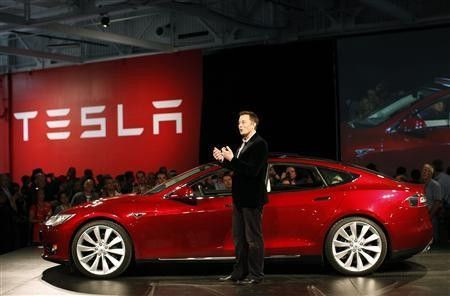California Fights Musk Over Factory Reopening, Other States See Tesla Jobs Key To Revival

KEY POINTS
- Elon Musk threatens to move Tesla out of California and sues Alameda County
- Musk move will hurt California, already facing high unemployment and a budget deficit
- Other states see Musk's decision as an economic opportunity
California can expect to more economic pain if Tesla CEO Elon Musk makes good on his threat to move the electric carmaker's headquarters and future operations to Texas or Nevada.
Musk has already filed a lawsuit against the Alameda County alleging violation of federal and California constitutions, as well as defying the governor. The lawsuit was in response the county's health officer Erica Pan prohibiting the company from reopen its Fremont factory despite Gov. Gavin Newsom’s “go” signal.
Pan's decison was supported by San Diego assemblywoman Lorena Gonzales, who posted an expletive-laced tweet against Musk. But any job losses and uncertainity from Tesla's move will only add to the pain of the economic devastatation and job losses from the coronavirus padmeic and pile pressure on the state's leadership.
Tesla is filing a lawsuit against Alameda County immediately. The unelected & ignorant “Interim Health Officer” of Alameda is acting contrary to the Governor, the President, our Constitutional freedoms & just plain common sense!
— Elon Musk (@elonmusk) May 9, 2020
F*ck Elon Musk.
— Lorena Gonzalez Fletcher (@LorenaSGonzalez) May 10, 2020
Since mid-March, the pandemic has forced the state to pay out more than $10 billion of unemployment claims filed by more than 4.2 million citizens of the country’s largest economy. This number, for which the state borrowed $348 million in federal funds, is a striking reversal from the record low unemployment rate of 3.9% that Newsom shared in January.
“This is Depression-era numbers in terms of the unemployment you’ll see across this country, not just in the state of California,” Newsom said, calling the numbers are "jaw-dropping" and "alarming."
In 2017, Tesla created 51,000 jobs with the Fremont factory's first expansion, helping the state reach that 3.9% unemployment rate. The company even aimed to double the factory's size which in turn would multiply the job openings in California. But with this relocation, these jobs might just be given to lucky citizens outside the state.
California's loss can be good news for Texas, Nevada, Utah, or Georgia, the states that have lined up to extend a welcome hand to Musk. And more states could follow.
Dan Rodimer, Nevada's congressional hopeful, tweeted: "Nevada needs these jobs most of all right now, @elonmusk. We would love to have you and Tesla HQ right here in the Battleborn State!"
Rep. Jody Hice, R-Ga., and Utah Lieutenant Gov. Spencer Cox too joined the chorus.
"Hey @elonmusk, I hope you consider Georgia — named the best state to do business 7 years in a row," Hice tweeted.
Texas gets better every day. Good conservative principles make good governance, and attract the best and the brightest. The future is happening in Texas. https://t.co/ZuRzHvqqu5
— Dan Crenshaw (@DanCrenshawTX) May 9, 2020
Should Texas get the Tesla headquarters and factory, the second-largest economy in the country might just take California's leading position. If Tesla chooses Nevada, the state's economy that heavily relied on tourism and is now in peril can get a shot in the arm.
Just because you don’t see it doesn’t mean it’s not happening. We talk to Tesla regularly and are very engaged with them on bringing more business to Utah.
— Spencer Cox (@SpencerJCox) May 10, 2020
Hey @elonmusk, I hope you consider Georgia — named the best state to do business 7 years in a row. https://t.co/KdID3d1v0r
— Rep. Jody Hice (@CongressmanHice) May 10, 2020
However, what Musk could bring in terms of additional jobs to the state or states that Tesla will move to will depend a lot on how the company navigates a sales environment sans the tax credit that had fuelled its sales in recent years. The $7,500 tax subsidy, which each Tesla buyer enjoyed till 2018 end, significantly help the sales of the company's electric cars. But the tax credit, which reduced to $3,750 a car in 2019, has ended completely. And it remains to be seen if the company can generate the same level of sales.
California has highly subsidized a company that has always disregarded worker safety & well-being, has engaged in union busting & bullies public servants. I probably could’ve expressed my frustration in a less aggressive way. Of course, no one would’ve cared if I tweeted that.
— Lorena Gonzalez Fletcher (@LorenaSGonzalez) May 10, 2020
Direct selling of Tesla cars is banned in many states including Texas, and being away from the epicenter of the electric car industry in the US is a risk. But Musk, who already hinted at the construction of a factory in Texas in February, might be unstoppable in making another attempt to win the legal battle and move Tesla to a central state.
Aside from losing Tesla and employment possibilities, California is facing a budget deficit of $54 billion -- from the $6 billion used to counter the spread of COVID-19, $7 billion for health and human services mainly from Medi-Cal, and $41 billion loss of revenue. And local government units are asking for aid from lawmakers.
Phil Ting, chairman of the budget committee of the state’s Assembly, said cuts in spending are not enough to fill the shortfall, and options for additional revenue are being sought. In January, California lawmakers considered taxing vapor products but, with the increasing unemployed population, Californians may find these new fees difficult to pay for.
As of now, both California and Tesla are losing. But, Tesla is preparing to start production Monday.
© Copyright IBTimes 2025. All rights reserved.





















